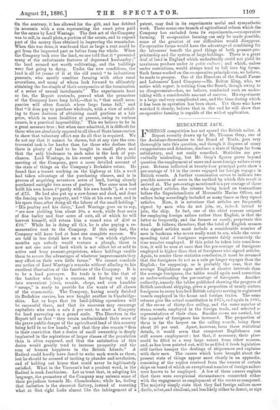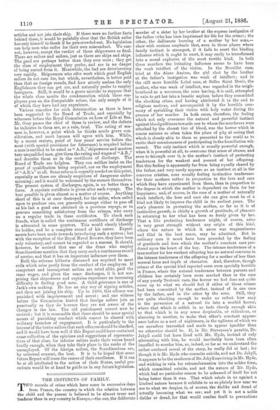MERCANTILE JACK.
articles. Now, it is notorious that articles are frequently signed by men who do not join, or, indeed, intend to join, the ship. In fact, one of the chief reasons assigned for employing foreign sailors rather than English, is that the latter so frequently, and the former so rarely, perpetrate this fraud. It follows, therefore, that the total of English seamen who signed articles must include a considerable number of men in buckram who never really went to sea, while the corre- sponding total of foreigners represents fairly accurately the true number employed. If this point be taken into considera- tion, it will be seen at once that the per-tentage of foreigners employed is higher than that of foreigners who signed articles. Again, to render these statistics conclusive, it must be assumed that the foreigners do not as a rule go longer voyages than the English ; for supposing, as is probably the case, that the average Englishman signs articles at shorter intervals than the average foreigners, the tables would again need correction as under-estimating the per-tentage of foreigners. Another authority, namely, the tables published showing the progress of British merchant shipping, gives a proportion of nearly sixteen foreigners to every hundred British subjects serving in registered vessels employed in the home and foreign trades. The some returns give the actual constitution in 1875, and again in 1885, of the crews of thirty-five sailing, and the same number of steam vessels, employed in the foreign trade, and selected as representatives of their class. Smaller crews are carried, but the number of foreigners has increased. Tho proportion of them is far the largest on the sailing vessels, being there about 26 per cent. Apart, however, from these statistical details, it would seem that competent Englishmen can still secure employment ; but that, if necessary, their place could be filled to a very large extent from othet sources, and, as has been pointed out, will be so filled if fresh legislation still further hamper the dealings of shipowners and captains with their men. The causes which have brought about the present state of things appear most clearly in an appendix, consisting of the replies received from the owners of certain ships on board of which an exceptional number of foreign sailors were known to be employed. A few of these owners explain that there were exceptional circumstances connected either with the engagement or employment of the crews so composed. The majority simply state that they find foreign sailors more docile, sober,and obedient, and less likely either to desert, or sign
articles and not join their ship. If there were no farther facts behind these, it would be painfully clear that the British sailor has only himself to thank if he gets crowded out. No legislation can help men who suffer for their own misconduct. We can- not, however, accept the verdict of these shipowners as final.
There are sailors and sailors, just as there are ships and ships. The good are perhaps better than they ever were ; they get the class of employment they prefer, and are in no danger of being ousted from it. Meanwhile, the bad are deteriorating very rapidly. Shipowners who offer work which good English sailors do not care for, but which, nevertheless, is better paid than that on foreign vessels, find how utterly useless the only Englishmen they can get are, and naturally prefer to employ foreigners. Still, it would be a grave mistake to suppose that the whole class merits the condemnation which these em- ployers pass on the disreputable refuse, the only sample of it of which they have had any experience.
Various remedies for such deterioration as there is have been suggested to the Board of Trade, and especially by witnesses before the Royal Commission on Loss of Life at Sea. Mr. Gray passes the chief of these in review, and the defects he indicates in them are, as a rule, fatal. The rating of sea- men is, however, a point which he thinks needs grave con- sideration, and most laymen will agree with him. While, by a recent statute, proof of four years' service before the mast (with special provisions for fishermen) is required before a man is entitled to be rated as " A.B.," shipowners and masters take unqualified men, give them the rating and wages of "A.B.," and describe them so in the certificate of discharge. The Board of Trade aro helpless. They can neither insist on the proof of qualification being required, nor on the employment of " A.B.'s " at all. Some reform is urgently needed on this point, especially as there are already suspicions of dangerous under- manning ; and it would be welcomed by the seamen themselves. The present system of discharges, again, is no better than a farce. A separate certificate is given after each voyage. The best possible is given almost as a matter of course. Anything short of this is at once destroyed, for the sailor, when called upon to produce one, can generally manage either to pass off as his last a good one obtained on a previous voyage, or to procure something satisfactory from the crimps, who carry on a regular trade in these certificates. To check such frauds, what is called the continuous certificate of discharge is advocated in some quarters. This would clearly identify its holder, and be a complete record of his career. Experi- ments have been made towards introducing such a system ; but with the exception of the Royal Naval Reserve, they have been only voluntary, and cannot be regarded as a success. It should, however, be noticed that one of the firms who employ Scandinavians mention that they carry such a continuous record of service, and that it has an important influence over them.
Both the reforms hitherto discussed are required to meet evils which arise partly from the conduct of the employers. If competent and incompetent sailors are rated alike, paid the same wages, and given the same discharges, it is not sur- prising that shipowners and captains experience an increasing difficulty in finding good men. A third grievance is one of Jack's own making. He has an airy way of signing articles, and then not joining his ship. Up to 1880, this offence was punished with imprisonment and arrest ; and one witness before the Commission hinted that foreign sailors join as punctually as they do because they are not aware of the changes in the law. The old punishment cannot now be revived ; but it is reasonable that there should be some special means of punishing conduct which cannot be classed with ordinary breaches of engagement. It is particularly to the interest of the better sailors that such offences should be checked, and it would have been well if this Report could have contained some collection of the opinions and suggestions of representa- tives of that class, for inferior sailors make their voices heard loudly enough, when they take their place in the ranks of the unemployed. Of the foreign sailors, the Scandinavians are, by universal consent, the best. It is to be hoped that some future Report will trace the causes of their excellence. If it can be at all attributed to the action of their States, useful pre- cedents would be at hand to guide us in any future legislation.



































 Previous page
Previous page